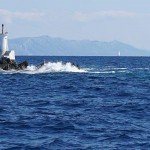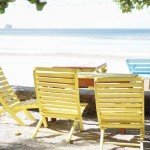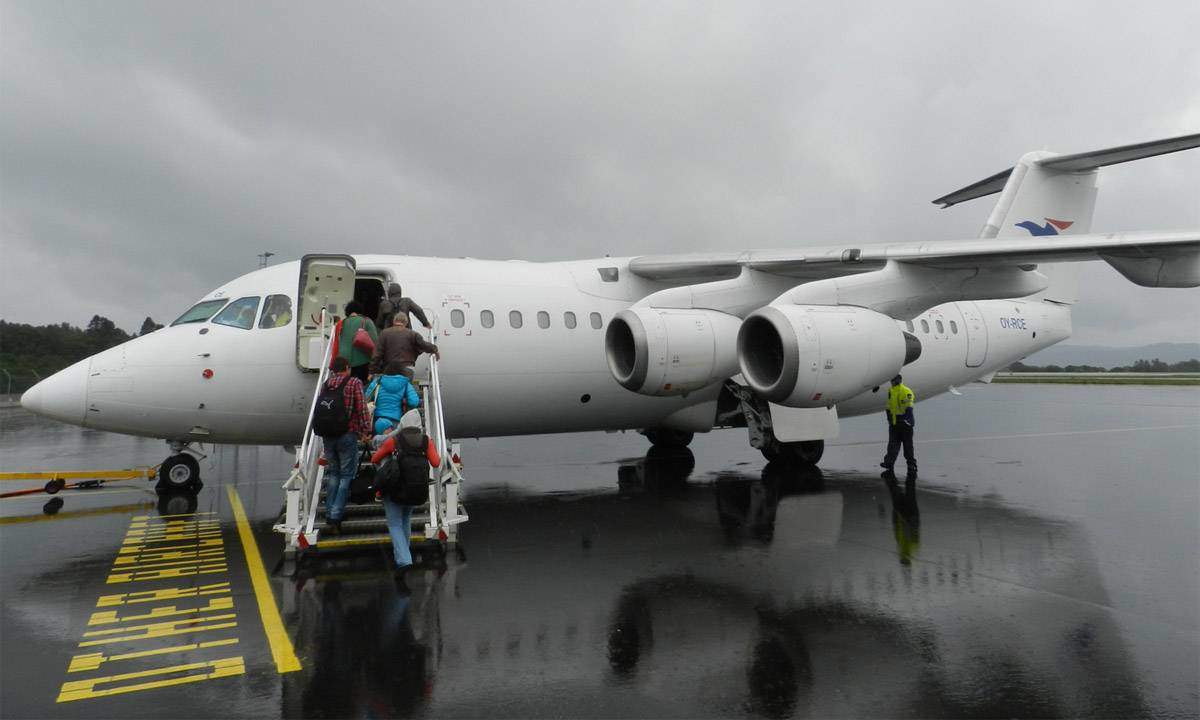At a point midway between Norway and Iceland, where the cold North Atlantic meets the even more frigid Norwegian Sea, a gorgeous huddle of islands sits subject to the vagaries of harsh Nordic weather. The Faroe Islands, 18 of them in all, comprise a self-governing territory belonging to Denmark.
Along with their abundant rugged beauty, wild seascapes, pitch-tarred timber houses with grass roofs, and more sheep than people, the Faroes offer about 300 rainy days per year, and getting there can be an adventure unto itself.
Undaunted by the remoteness, in fact attracted to it, in 2012 my family booked a trip to the Faroes to meet a friend and her family for a weeklong stay in Tórshavn, the islands’ capital. The final leg of our flight, from Reykjavik’s domestic airport, started inauspiciously with a delay. After my husband, youngest son and I boarded the small Atlantic Airways BAe 146 jet, the plane sat on the runway due to a computer problem. Half an hour later, the computer problem was fixed, but it was foggy in the Faroes, so we disembarked to wait in the terminal. At the time we were scheduled to land at Vágar, the Faroe Islands’ airport, I tried to call my friend. Using one of the last payphones in the world, I spent $30 for a one minute call to what turned out to be a wrong number.
Two hours after our original departure time, we took off. We’d lost a whole day in the Faroes, but at least we’d arrive in time for dinner.
After an uneventful hour-and-a-half trip over the deep blue North Atlantic Ocean, the pilot announced that fog had again descended upon Vágar, and we would circle for a while. Thirty minutes later, we buckled up and prepared for landing. The window streamed silver filaments of moisture as we descended into the blinding white cloudbank. But instead of breaking through the clouds, the dazzling nothingness enveloped us for what seemed a long time before we ascended out of it. We circled some more. Then, an announcement, first in Faroese, then Danish and Icelandic, and finally English. Fuel was low and we needed to divert elsewhere for landing. We were going to Wick, Scotland.
We approached Scotland in the late afternoon, its striated cliffs rising from a grey sea striped with whitecaps. Upon landing we were told to sit tight. At first we understood that the pilot was debating whether to refuel and try again, but it turned out that the real problem was with immigration. This tiny, provincial airport had no international flights and therefore no immigration personnel. In seven days, the 2012 London Olympics would begin, and the country was on high security alert. Though it would be the luckiest terrorist in the world to gain entrance to the UK via a diverted flight to the Faroe Islands, they were taking no chances. The toilets were overflowing and we were getting restless, held hostage to the stubborn logic of bureaucracy.
Finally, officials herded us onto buses gathered outside the airport. There we sat as the sun set at 10 pm, the small children whiny and restless with a boredom that the adults tried to quell in themselves. At one point a man with a cell phone took my husband and me out of the van. He passed the phone to my husband, who answered questions from an immigration agent in Aberdeen about our reason for going to the Faroes, the length of our stay and other info. Back into the van we went to wait some more until we were finally let off. In the terminal, flight attendants passed out the remnants of the plane’s provisions. We feasted on duty-free Kit-Kats and Raisinets, and sipped straight from little bottles of red wine.
We grew familiar with some our fellow passengers, mostly Faroese expatriates on their way home for visits. A contingent of musicians headed for the G! Festival included a famous Swedish pop star named Veronica; sailors returned home after a year at sea; a group of cyclists; a smattering of tourists like us.
I borrowed a security guard’s cell phone to call our friend in the Faroes, who already knew about our situation. I ended the conversation with a cheery, “See you tomorrow.”
The Scottish security people urged the pilot to leave the terminal for the hotel without permission. The pilot, quite understandably, was reluctant. But as it approached midnight, he decided to defy the authorities and we re-boarded the buses and rode into the dark night for Castletown, 20 miles away.
We flooded into the rambling Castletown Hotel, everyone demanding dinner at once. Ours was the first bus to arrive; others were still waiting to eat, clamoring at the two harried but stoic servers, when we retired to our bedroom at 1 am.
Reporting to the lobby for a 9 o’clock departure, we learned we wouldn’t be leaving for a few hours and were free to explore. My husband, son and I walked to the sea, stopping at the ruins of an abandoned settlement of quarry worker’s houses. Castletown once provided flagstone to the world: The stones paving the streets of San Francisco come from its local quarries. When concrete paving was introduced in the 1920’s, the town fell into decline.
After inspecting the tidal pools pocking the flat rock shelf that stretched into the surf and skipping rocks toward the cliffs on the other side of the bay, we returned to the hotel to wait.
Back at the airport, we waited some more. A lunch of greasy fish and chips came accompanied by a voucher for a coffee from the tiny little café. The town must have seen a spike in revenue from our unexpected visit, as the hotel had seemed empty of other guests and no flights came into or left the airport while we waited.
At 3 pm, we boarded the plane, returning to our now-familiar seats, friendly with the people sitting nearby. In front of us were a young Faroese couple and their adorable three-year old daughter, on their way home for their yearly visit. They worked in Denmark, as many Faroese do, and had stopped in Iceland first to visit some friends. The woman told us that the Vágar Airport was often fogged in, and that sometimes it took 12 hours or so for conditions to clear up. She was deathly afraid of flying and spent most of the time in the air in white-knuckled terror.
A collective good mood reigned. The sailors broke out bottles of rum and shared it freely. A man with receding gray hair and a trim mustache stood up in the aisle and led the Faroese in traditional song, which was belted out with gusto.
We chased our tail over Vágar for a bit before the pilot went in for the landing. As before, we sank into the disconcerting void of the clouds, today a dull graphite. After what seemed like an endless descent, we emerged to see lush, green land dotted with timber houses nestled amongst a filigree of argent streams. Down, down, down we went, past a plunging waterfall, low enough to pick out grazing sheep, and just as it seemed that we would touch down, the plane rose again. The pilot came on to report a localized patch of fog right over the runway. We would circle some more. The woman in front of us translated, and then again, almost in tears, when another announcement shortly thereafter elicited disbelieving gasps. We were headed for Bergen, Norway.
On the airport bus from the plane to the terminal, the sailors swigged rum and continued to sing. Veronica, the pop star, was composing a song on her iPhone based on the Faroese songs she’d just heard. We waited in the terminal for our luggage and further instructions. There, Veronica said she was done, she could not make her gig now, and there was no point going on. “My agent will take care of the details,” she airily announced and strode out of the terminal. A clump of cyclists, obliged to tote their bicycles packed in crates, consulted seriously; two decided to give up.
Though we saw nothing more than the tall Norwegian pines on the way to the airport hotel, my husband and I decided we’d return to Bergen someday. We ate dinner with the Faroese choirmaster, who lived in Greenland, where he was in charge of waste management, a complicated task in a country of sparse population, vast open spaces and unique environmental considerations. As a college student in the 1970s, he’d become interested in the largely forgotten traditional sagas that were told through song and dance, and formed a club that ushered in a revival of the art form. Now, all Faroese knew the songs by heart, as we had seen on the plane.
I called my friend in the Faroes to update her. Her family and my oldest son had flown into Vágar on a flight mere hours before ours. I wondered if, without that initial computer problem, we would have made it in before the fog settled.
The next morning, the clear blue sky and bright Nordic summer sun persuaded us that today we would make it to our elusive destination. Waiting for the announcement of our flight, we explored our little section of the Bergen airport, checking out the Scandinavian breakfast foods of black bread and pickled herring, silky folds of gravlax on crispbread, and the same clumpy scrambled eggs that could be found in airports around the world. Weary travelers midway through their journeys were quaffing beer, our early morning their eternal night. It was the day after the first year anniversary of the Breivik massacre, and the newspapers featured heartrending photos of memorial services.
During the four-hour wait, we swapped stories with our fellow travelers. A Japanese woman and her Icelandic husband were on their way to the Faroes to visit friends, and we discussed why so many Icelanders married Japanese, deciding that the island nation mentality of self-reliance and hardiness made them uniquely compatible. A Faroese woman had already missed her father’s funeral the day before, and a family would miss a wedding unless we arrived in the next few hours. Another woman on her way home from holiday had to be in the office on Monday, the only person on the schedule. An American with such flamboyant facial hair that we had dubbed him Mr. Mustache was going camping around the islands. A few of the musicians were still with us, plus a shrunken contingent of cyclists, and the rowdy sailors.
Shortly before noon, we boarded the plane. The crew no longer bothered to give the pre-flight safety instructions. The pilot announced the weather was still “teasing.” We felt the plane fall into a now-familiar pattern of leftward banking. We never even descended, just circled and circled, like a hawk riding the thermals in search of prey. To lighten the mood, the choir master stood up to sing in the aisles and others joined in, though not as lustily as the day before.
Finally, the pilot started his multi-lingual announcement, and I didn’t have to wait until he got to the English to know it was not good news because the woman in the row in front of us burst into tears. We were going to Copenhagen.
Once we landed, we learned that the flight was over. If we wished to proceed to the Faroes, we’d have to go to the transfer desk for new boarding passes.
My husband had had enough. We were short on sleep, bloated with hurried airport and hotel meals, three days of our weeklong stay in the Faroe Islands already wasted. He advocated for staying in Copenhagen and meeting our friends and son later in Iceland. But the agent at the transfer desk told us that we would have to buy separate tickets to return to Iceland, with no reimbursement for our aborted trip. The airline could not guarantee that the Faroes flight would depart that day. It seemed doubtful that, after footing the bill for two hotels, three square meals a day, bus transport, and jet fuel, the flight would be taking off unless chances were good that it would land. If it didn’t take off, we’d have to spend the night in Copenhagen, at our own expense.
The desk agent eventually announced that the flight would leave that evening, and we took a family vote whether to make another try: my husband no, me yes. The tie breaker was our son, who said, with the eternal optimism of youth, we’d gone this far, we might as well go for it. So we did.
Lo and behold, the flight boarded at 9 pm. From the smattering of new faces, it seemed that a quarter of the original passengers had bailed. The flight was short, we didn’t circle. The wind was strong but there was no fog. Buffeted by the wind, the plane shuddered back and forth as it swooped to the ground. The woman in front of us buried her head in her husband’s neck.
When we touched down, the original passengers went wild, triumphant and cheering. The newcomers on the plane looked on in bemusement.
Sixty hours and four countries after our initial takeoff, we had finally reached the Faroe Islands. We had a wonderful, short, sweet visit, but that is another story.






